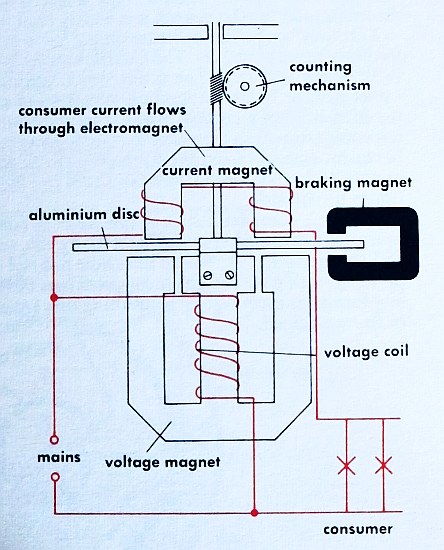HOW A KWH-METER WORKS

H O W A KWH - M E T E R W O R K S
===================================================================
Text + Picture taken from the book "The Way Things Work"
Simon and Schuster, NewYork (1967), p.222 - 223, Fig.3
-------------------------------------------------------------------
There are two electromagnets. The coil of one of these is energised
by the consumer current; the other magnet coil is connected to the
consumer voltage. If the current and the voltage in the consumer
circuit are in phase with each other, then the current in the
voltage coil, and therefore the magnetic field of this coil, will
have a lag of one-quarter period (90°) in relation to that of the
current coil. The interaction of the two coils produces a moving
magnetic field which induces eddy currents in the light aluminium
rotor disc. These currents cause the disc to rotate in the direc-
tion of motion of the moving field. The speed of rotation of the
disc is proportional to the strengths of the two magnetic fields,
but it is also dependent upon the phase displacement of these
fields, and therefore upon the power factor cos(φ) ... The braking
magnet (on the right) constantly produces eddy currents in the
rotor; these damp the rotation and thereby ensure that the rotor
stops instantly when the consumer current ceases to flow.
-------------------------------------------------------------------
R E M A R K S : P[W] = U[V] * I[A] * cos(φ)
For "ohmic" consumer loads is the phase φ = 0 and cos(φ) = 1
For "inductive" or "capacitive" consumer loads the phase shifts:
φ =/= 0 and therefore cos(φ) =/= 1
In extreme: φ = +/- 90° and therefore cos(φ) = 0
In this case the two magnetic fields in the meter will be in phase
and the rotor will then cease to rotate!
Back to the kwh-Meter Site ...
impressum:
*******************************************************************
© C.HAMANN http://public.BHT-Berlin.de/hamann * 02/14/16
|